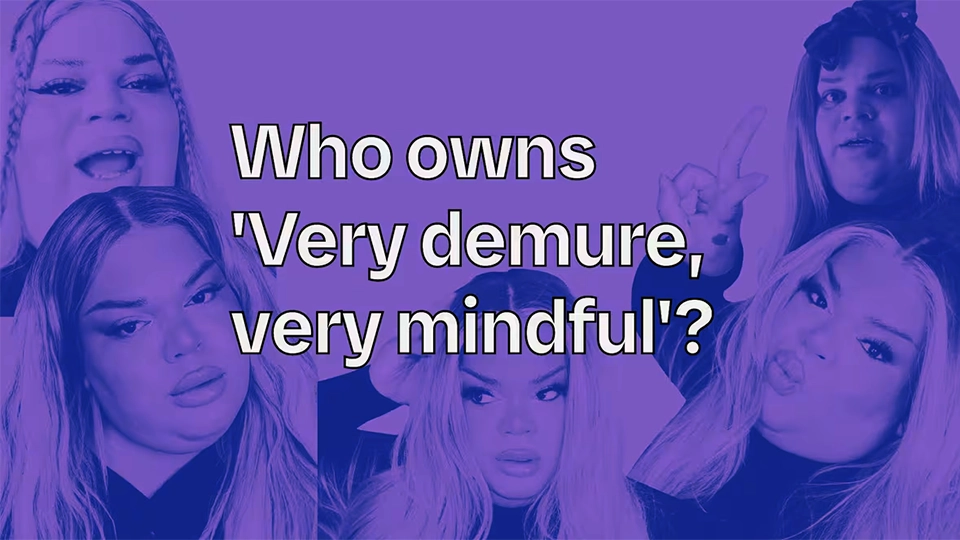
In the ever-evolving world of social media and internet trends, viral memes and catchphrases often become cultural phenomena. One such phrase that has taken the internet by storm is "Very Demure, Very Mindful." If you've spent any time on TikTok recently, you've probably come across this phrase, popularized by influencer Jools Lebron. But what happens when a viral catchphrase becomes the center of a legal battle over trademark rights? Here's everything you need to know about the ongoing trademark dispute surrounding "Very Demure, Very Mindful."
What is "Very Demure, Very Mindful"?
"Very Demure, Very Mindful" started as a light-hearted, viral meme on TikTok, capturing the attention of millions with its catchy and relatable nature. The phrase quickly became synonymous with a certain lifestyle and attitude, prompting countless users to create content around it. Jools Lebron, the originator of the trend, has since become a household name, securing brand deals and media appearances all centered around this viral catchphrase.
Jools LeBron, the creator who popularized “demure,” shares she’s unable to launch merch because her viral phrase was already trademarked:
— Pop Crave (@PopCrave) August 24, 2024
“I wanted this to do so much for my family and provide for my transition and I just feel like I dropped the ball.” pic.twitter.com/FxTVHfb6Lo
The Trademark Dispute: What Happened?
Recently, a lesser-known individual named Jefferson A. Bates filed an application with the US Patent and Trademark Office (USPTO) to register "Very Demure, Very Mindful" as a trademark. This move has sparked outrage among fans and followers of Jools Lebron, as Bates appears to have no direct connection to the creation or popularization of the phrase. The application has garnered significant media attention, with headlines across major outlets highlighting the legal tussle.
Understanding Trademarks and Trademark Registration
Before diving deeper into the specifics of this case, it's essential to understand what a trademark is. A trademark is a word, phrase, symbol, or design that distinguishes the source of goods or services from those of others. It can include anything from logos and brand names to specific sounds or catchphrases. While anyone can apply for a trademark, securing registration is not guaranteed. The USPTO evaluates each application to ensure it meets specific criteria and doesn't infringe on existing trademarks.
The Implications for Jools Lebron
Jools Lebron's fans were quick to voice their concerns online, with many fearing that she might lose the rights to her now-iconic phrase. However, it's important to note that the filing of a trademark application does not automatically grant ownership. Lebron still has options, including opposing Bates' application based on her prior use of the phrase in commerce. Given her widespread recognition and the commercial deals she's secured with brands like Verizon, Lebron has a strong case for claiming ownership of the trademark.
What Could Happen Next?
The trademark application process is lengthy and can take several months or even years to resolve. During this time, other interested parties, including Lebron, can file their applications or oppose Bates' registration. Additionally, the USPTO may reject Bates' application for various reasons, such as lack of sufficient documentation or potential overlap with existing trademarks.
The Public Backlash and Its Consequences
Since the news of the trademark filing broke, Jefferson A. Bates has faced significant backlash from the public. Online reviews and comments have flooded various platforms, criticizing Bates for attempting to capitalize on someone else's creation. The situation has even led to the creation of a Google Maps listing at Bates' listed address, further fueling the controversy.
What This Means for Viral Trends and Trademarks
The "Very Demure, Very Mindful" trademark dispute serves as a reminder of the complexities surrounding intellectual property in the digital age. As memes and viral trends continue to shape popular culture, the legal implications of trademarking such phrases will likely become more prevalent. For influencers and creators like Jools Lebron, understanding the nuances of trademark law is crucial to protecting their work and ensuring that they retain control over their intellectual property.
